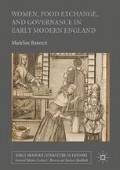Abstract
As I have argued in this book, early modern women’s comprehension of food exchange was underpinned not only by Galenic physiological and providential ways of thinking, but also by Erasmian humanism, which supported the political inflection of temperance offered by women such as Mary Sidney Herbert, Elizabeth Clinton, Margaret Hoby, and Mary Wroth. In this epilogue, I suggest that the model of food exchange developed by these writers is distinctly Protestant in character, and communicates a religious and political perspective that disappears in the latter half of the seventeenth century.
Access this chapter
Tax calculation will be finalised at checkout
Purchases are for personal use only
Notes
- 1.
Aemilia Lanyer, ‘To the Lady Elizabeths Grace’, ‘To the Ladie Katherine Countesse of Suffolke’, ‘The Authors Dreame to the Ladie Marie, the Countesse Dowager of Pembrooke’, in The Poems of Aemilia Lanyer: Salve Deus Rex Judaeorum, ed. Susanne Woods (Oxford and New York: Oxford University Press, 1993), p. 11, line 9, p. 38, line 51, p. 30, line 197 (Lanyer 1993).
- 2.
Anna Trapnel, The Cry of a Stone, ed. Hilary Hinds (Tempe, AZ: ACMRS, 2000), pp. 4, 8, 20, 24 (Trapnel 2000).
- 3.
Trapnel, Cry of a Stone, p. 60
- 4.
Trapnel, Cry of a Stone, pp. 20, 24.
- 5.
Trapnel, Cry of a Stone, p. 25.
- 6.
Trapnel, Cry of a Stone, p. 72.
- 7.
Madeline Bassnett, ‘Restoring the Royal Household: Royalist Politics and the Commonwealth Recipe Book’, Early English Studies 2 (2009): 1–32 (Bassnett 2009).
- 8.
But see Laura Lunger Knoppers, who makes the compelling argument that The Court & Kitchin indirectly criticizes the scaling-back of hospitality at Charles II’s court, in Politicizing Domesticity from Henrietta Maria to Milton’s Eve (Cambridge: Cambridge University Press, 2011), pp. 132–6 (Knoppers 2011).
- 9.
John Milton, Paradise Lost, ed. John Leonard (London and New York: Penguin, 2000), 5.398 (Milton 2000).
- 10.
Milton, Paradise Lost, 5.332, 344, 333, 336.
Bibliography
Anon. 1664. The Court & Kitchin of Elizabeth, Commonly called Joan Cromwel, the Wife of the Late Usurper. London.
———. 1653. A True Gentlewomans Delight. London.
Bassnett, Madeline. 2009. Restoring the Royal Household: Royalist Politics and the Commonwealth Recipe Book. Early English Studies 2: 1–32.
Knoppers, Laura Lunger. 2011. Politicizing Domesticity from Henrietta Maria to Milton’s Eve. Cambridge: Cambridge University Press.
Lanyer, Aemilia. 1993. The Poems of Aemilia Lanyer: Salve Deus Rex Judaeorum, ed. Susanne Woods. Oxford and New York: Oxford University Press.
May, Robert. 1660. The Accomplisht Cook. London.
Milton, John. 2000. Paradise Lost, ed. John Leonard. London and New York: Penguin.
Rabisha, William. 1661. The whole Body of Cookery Dissected. London.
Trapnel, Anna. 2000. The Cry of a Stone, ed. Hilary Hinds. Tempe, AZ: ACMRS, 2000.
W.M. 1655. The Queens Closet Opened. London.
Woolley, Hannah. 1670. The Queen-Like Closet. London.
Author information
Authors and Affiliations
Rights and permissions
Copyright information
© 2016 The Author(s)
About this chapter
Cite this chapter
Bassnett, M. (2016). Epilogue. In: Women, Food Exchange, and Governance in Early Modern England . Early Modern Literature in History. Palgrave Macmillan, Cham. https://doi.org/10.1007/978-3-319-40868-2_7
Download citation
DOI: https://doi.org/10.1007/978-3-319-40868-2_7
Published:
Publisher Name: Palgrave Macmillan, Cham
Print ISBN: 978-3-319-40867-5
Online ISBN: 978-3-319-40868-2
eBook Packages: Literature, Cultural and Media StudiesLiterature, Cultural and Media Studies (R0)

